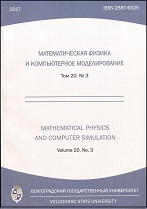|
This article is cited in 4 scientific papers (total in 4 papers)
Mathematics
On solvability of boundary value problems of the Poisson equation on non-compact Riemannian manifolds
E. A. Mazepa
Volgograd State University
Abstract:
This article is devoted to the investigation of the behavior of
solutions of the Poisson equation in relation to
the geometry of the manifold in question. Such problems originate
in the classification theory of non-compact Riemannian surfaces and
manifolds. For a noncompact Riemann surface, the well-known
problem of conformal type identification can be stated as follows:
Does a nontrivial positive superharmonic function exist on this
surface?
Many questions of this kind fit into the pattern of a Liouville-type theorem saying that the space of bounded solutions of some
elliptic equation is trivial. However, the class of manifolds admitting nontrivial
solutions of some elliptic equations is wide. For example,
conditions ensuring the solvability of the Dirichlet problem with
continuous boundary conditions “at infinity” for several
noncompact manifolds has been found in many papers (see, e.g.,
[12;18;21]). Notice that the very statement of the
Dirichlet problem on such manifolds could turn out nontrivial,
since it is unclear how we should interpret the boundary data.
In this article we study questions of existence and belonging to
given functional class of bounded solutions of the Poisson equation
$$
\Delta u=g(x), \,(1)
$$
where $g(x)\in C^{\gamma}(\Omega)$ for any subset $\Omega\subset\subset M$, $0<\gamma<1$ on a noncompact
Riemannian manifold $M$ without boundary.
Of keen interest is the interrelation between problems of
existence of solutions of equation (1) on $M$ and off
some compact $B \subset M$ with the same growth “at infinity”. In our research we use a new approach wich is based on
the consideration of equivalence classes of functions on $M$ (this
approach for bounded solutions of the Schrödinger equation has been realized in [9]).
Let $M$ be an arbitrary smooth connected noncompact Riemannian
manifold without boundary and let $\{B_k\}_{k=1}^{\infty}$ be an
exhaustion of $M$. Throughout the sequel, we assume
that boundaries $\partial B_k$ are $C^1$-smooth submanifolds.
Let $f_1$ and $f_2$ be arbitrary bounded continuous functions on $M$. Say
that $f_1$ and $f_2$ are equivalent on $M$ and write
$f_1\sim f_2$ if for some exhaustion $\{B_k\}_{k=1}^{\infty}$ of
$M$ we have
$$
\lim_{k\to\infty}\sup_{M\setminus B_k}|f_1-f_2|=0.
$$
It is easy to verify that the relation $``\sim``$ is an equivalence
which does not depend on the choice of the exhaustion of the
manifold and so partitions the set of all continuous functions on
$M$ into equivalence classes. Denote the equivalence class of a
function $f$ by $[f]$.
Let $B\subset M$ be an arbitrary connected compact subset and the
boundary of $B$ is a $C^1$-smooth submanifold. Assume that the
interior of $B$ is non-empty and $B\subset B_k$ for all $k$.
Observe that if the manifold $M$ has compact boundary or there is
a natural geometric compactification of $M$ (for example, on
manifolds of negative sectional curvature or spherically symmetric
manifolds) which adds the boundary at infinity, then this approach
leads naturally to the classical statement of the Dirichlet
problem (see, for instance, [7;12;18;21]).
Denote by $v_k$ the harmonic function in
$B_k\setminus B$ which satisfies to conditions
$$
\left.v_k\right|_{\partial{B}}=1,\qquad
\left.v_k\right|_{\partial{B_k}}=0.
$$
Using the maximum principle, we can easily verify that the
sequence $v_k$ is uniformly bounded on $M\setminus B$ and so is
compact in the class of twice continuously differentiable
functions over every compact subset $G\subset M\setminus B$.
Moreover, as $k\to\infty$ this sequence increases monotonically
and converges on $M\setminus B$ to harmonic function
$$
v=\lim_{k\to\infty}v_k,\qquad 0<v\leq 1,\qquad
\left.v\right|_{\partial{B}}=1.
$$
Also, note that the function $v$ is independent of the choice of
exhaustion $\{B_k\}_{k=1}^{\infty}$.
The function $v$ is
nothing but the capacity potential of the compact set $B$ relative
to the manifold $M$ (see [14]).
Call the manifold $M$ $\Delta$-strict if for some compact set
$B\subset M$ there is a ecapacity potential $v$ of $B$ such that
$v\in[0]$ (see [9]).
Say that a boundary value problem for (1) is
solvable on $M$ with boundary conditions of class $[f]$ whenever
there exists a solution $u(x)$ to (1) on $M$ with
$u\in [f]$.
Say that for a continuous function $\Phi(x)$ on $\partial B$ the
exterior boundary value problem for (1) is
solvable on $M\setminus B$ with boundary conditions of class $(\Phi, [f])$
whenever on $M \setminus B$ there exists a solution $u(x)$ to
(1) with $u\in[f]$ and $u|_{\partial
B}=\Phi$.
Similarly we can state boundary value problems on arbitrary
noncompact Riemannian manifolds for a
series of other second order elliptic differential equations (see
[5;8-11;16]).
We now formulate the main result.
Theorem 1. Suppose that for every positive constant $A$
the exterior boundary value problems for the equations (1) are solvable on $M \setminus B$ with boundary conditions $(A,[f])$.
Then the boundary value problem for (1) is
solvable on $M$ with boundary conditions of class $[f]$.
Theorem 2. Let $M$ be an $\Delta$-strict manifold. Suppose that the boundary value problem for (1) is
solvable on $M$ with boundary conditions of class $[f]$. Then for every continuous function $\Phi(x)$ on $\partial
B$ the exterior boundary value problem for (1) is
solvable on $M \setminus B$ with boundary
conditions $(\Phi, [f])$.
Keywords:
Poisson equation,
boundary value problem, noncompact Riemannian manifolds, the Dirichlet problem, functions' equivalence classes.
Citation:
E. A. Mazepa, “On solvability of boundary value problems of the Poisson equation on non-compact Riemannian manifolds”, Mathematical Physics and Computer Simulation, 20:3 (2017), 136–147
Linking options:
https://www.mathnet.ru/eng/vvgum188 https://www.mathnet.ru/eng/vvgum/v20/i3/p136
|

| Statistics & downloads: |
| Abstract page: | 239 | | Full-text PDF : | 138 | | References: | 38 |
|




 Contact us:
Contact us: Terms of Use
Terms of Use
 Registration to the website
Registration to the website Logotypes
Logotypes








 Citation in format
Citation in format 
